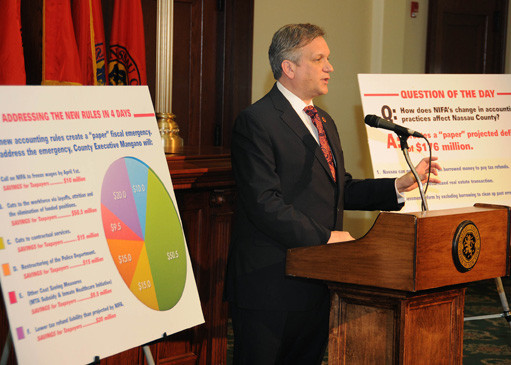Proposed spending cuts include layoffs
County executive unveils plan to trim $121.2 million
Facing a fiscal crisis, Nassau County’s leaders have difficult decisions to make. Raising property taxes and imposing budget cuts are two options and County Executive Ed Mangano said last week that he would choose the latter.
This week, Mangano was expected to unveil details of a plan that would trim about $121 million from the county’s $2.6 billion budget for next year in order to spare residents what he said would be a 21.5 percent property tax increase. The cuts include hundreds of layoffs and an employee wage freeze.
“By reducing spending and Nassau’s work force,” Mangano said, “I am taking the appropriate steps required to protect our homeowners from a property tax increase.”
In January, the Nassau Interim Finance Authority declared the county’s 2011 budget was unbalanced and imposed a control period over the county. During the control period, NIFA — a seven-member board created by the state in 2000 to monitor the county’s finances — will force the county to pass a budget with a deficit of no more than one percent. According to NIFA, this means the county has to pass a budget in which expenditures are equal to revenues (NIFA claimed on its website that the 2011 county budget had an operating deficit of more than seven percent, a point contested by Mangano).
When NIFA first announced it would be implementing a control period, Mangano took it as an affront. “Although the County Comptroller and County Legislature concluded that the 2011 budget was balanced, NIFA took the unprecedented step to impose a control period not even one month into the budget year,” Mangano said in a release in late January. “Simply put, NIFA’s action is unfounded, unfair and wrong.”
In response to what he felt was a politically motivated action, Mangano filed a lawsuit against NIFA to stop the control period. But last week, Judge Arthur Diamond dismissed the case, upholding NIFA’s control period. Mangano claimed that NIFA was changing accounting practices and creating a 21.5 percent tax increase for residents by creating a “paper deficit.”

 64.0°,
Partly Cloudy
64.0°,
Partly Cloudy 




